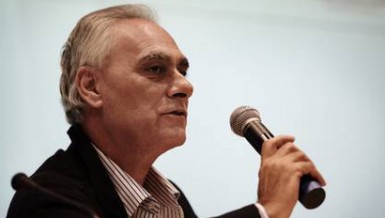
By James M. Dorsey
Football, alongside minority Shi’a Muslims and relatives of imprisoned government critics, is emerging as a focal point of dissent in Saudi Arabia, an oil-rich kingdom that, despite banning demonstrations by law, is struggling to fend off the waves of change sweeping the Middle East and North Africa.
Fan pressure is evolving as a potent tool in the absence of the right to protest. It follows intermittent demonstrations and at times deadly clashes with security forces in the kingdom’s predominantly Shi’a eastern province that hosts its major oil fields as well protests by family members of activists imprisoned for lengthy periods of time without being charged.
In the latest assertion of fan power, a Facebook page entitled Nasrawi Revolution demands the resignation of Prince Faisal bin Turki, the owner of storied Riyadh club Al Nasser FC and a burly nephew of King Abdullah bin Abdulaziz Al Saud who sports a moustache and chin hair. A YouTube video captured Prince Faisal seemingly being pelted and chanted against as he rushed off the football pitch after rudely shoving a security official aside.
The campaign against Prince Faisal follows last year’s unprecedented resignation of Prince Nawaf bin Faisal as head of the Saudi Football Federation (SFF), the first royal to be persuaded by public pressure step down in a region where monarchical control of the sport is seen as politically important.
Prince Nawaf’s resignation led to the election of a commoner, storied former player Ahmed Eid Al-Harbi widely viewed as a reformer and proponent of women’s football, in a country that views free and fair polling as a Western concept that is inappropriate for the kingdom. Prince Nawaf retained his position as head of the Saudi Olympic Committee and the senior official responsible for youth welfare that effectively controls the SFF.
Nevertheless, the resignation of Prince Nawaf and the campaign against Prince Faisal gains added significance in a nation in which the results of premier league clubs associated with various members of the kingdom’s secretive royal family are seen as a barometer of their relative status, particularly at a time that its septuagenarian and octogenarian leaders prepare for a gradual generational transition.
“The Saudis are extremely worried. Football clubs rather than the mosque are likely to be the centre of the revolution. Kids go more to stadiums than to mosques. They are not religious, they are ruled by religious dogma,” says Washington-based Saudi dissident Ali Al-Ahmed, who heads the Gulf Institute.
Sport sources in the football-crazy kingdom say the authorities are seeking to reduce football’s popularity by emphasising other sports like athletics and handball in policy and fundraising while at the same time preparing to professionalise and further commercialise the sport using the English Premier League as a model.
“They are identifying what talent is available in the kingdom. Football is a participatory sport. They want to emphasise the social aspects of other sports. Football won only one medal in the last Asian Games. They think they can score better in other sports. There are parallel agendas with competition about who gets the visibility,” one source said.
The clergy’s puritan view of life that only allowed for the emergence of football in the 1950s is under pressure with clerics being forced to retreat from their refusal to permit physical education for girls and women’s sports facilities. Saudi Arabia recently announced it would allow girl’s physical education in private schools as long as they do so in line with Islamic law. Yet, a five-year national sports plan, the kingdom’s first, currently being drafted does not make provisions for women’s sports.
In a further move, sports sources say Saudi Arabia may be on the verge of licensing women’s football clubs that currently operate in a legal nether land often with the help of more liberal members of the royal family.
James M. Dorsey is a senior fellow at the S. Rajaratnam School of International Studies, director of the University of Würzburg’s Institute of Fan Culture, and the author of The Turbulent World of Middle East Football blog.




